Participants
Organisations
Administering Organisation
Macquarie University (MQ)
Collaborating Organisations
Curtin University (CU)
University of Western Australia (UWA)
Partners
Australian Partner
Geological Survey of Western Australia (GSWA)
Dr Ian Tyler - CCFS Leader GSWA
International Partners
CNRS and Université de Montpellier, France
Institute of Geology and Geophysics, Chinese Academy of Sciences, Beijing, China
University of Maryland, USA
University of Saskatchewan, Canada
Bayreuth University, Germany
Chief Investigators
Associate Professor Elena Belousova - MQ
Professor Simon Clark - MQ
Associate Professor Marco Fiorentini, Node Leader - UWA
Professor Stephen Foley, Research Coordinator - MQ
Professor William Griffin - MQ
Professor Matt Kilburn - UWA
Professor Zheng-Xiang Li - CU
Associate Professor Alexander Nemchin - CU
Associate Professor Craig O'Neill - MQ
Professor Suzanne Y. O'Reilly, Director - MQ
Professor Martin Van Kranendonk - University of NSW
Professor Simon Wilde, Node Leader - CU
Associate Professor Yingjie Yang - MQ
Partner Investigators
Australian Partner Investigator
Dr Klaus Gessner - Geological Survey of Western Australia
Professor T. Campbell McCuaig, - BHP Billiton
International Lead Partner Investigators
Professor Michael Brown - Maryland
Dr David Mainprice - Montpellier
Professor Catherine McCammon - Bayreuth
Professor Fuyuan Wu - CAS Beijing
Associate Investigators
Associate Professor Juan Carlos Afonso - MQ
Dr Olivier Alard - MQ
Associate Professor Nathan Daczko - MQ
Professor Simon George - MQ
Dr Richard Glen - MQ Adjunct Professor
Dr Masahiko Honda - Australian National University
Professor Dorrit Jacob – MQ
Associate Professor Mary-Alix Kaczmarek – University Paul Sabatier Toulouse III
Associate Professor Christopher Kirkland - CU
Professor Jochen Kolb - GEUS
Dr Yongjun Lu - GSWA
Professor Louis-Noel Moresi - University of Melbourne
Professor Steven Reddy - CU
Dr Svyatoslav Shcheka - MQ
Associate Professor Bruce Schaefer - MQ
Dr Michael Wingate - GSWA
Professor Shijie Zhong - University of Colorado, Boulder, USA
Early Career Researchers
Dr Raphael Baumgartner - UWA
Dr Montgarri Castillo-Oliver - MQ
Dr Chunfei Chen - MQ
Dr Denis Fougerouse - CU
Dr Michael Förster - MQ
Dr Hadrien Henry - MQ
Dr Johannes Hammerli - UWA
Dr Uwe Kirscher - CU
Dr Hugo Olierook - CU
Dr Beñat Oliveira Bravo - MQ
Dr Romain Tilhac - MQ
Dr Lei Wu - CU
A full list of 2019 CCFS participants is given in Appendix 2 and kept current at Participants
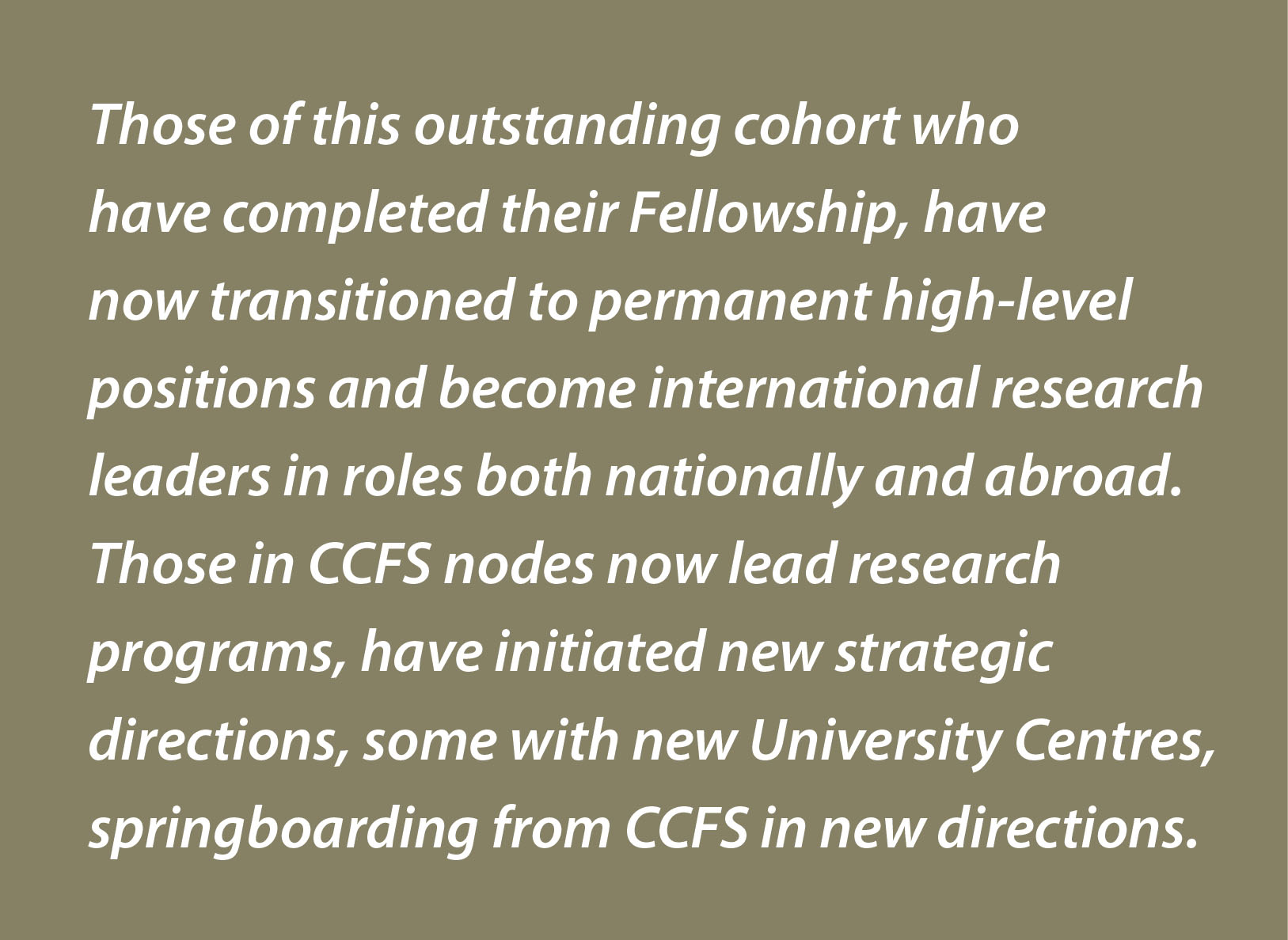
CCFS FUTURE FELLOWS
The application for the CoE CCFS foreshadowed that such a Centre of Excellence would become an attractor for rising stars and research leaders in relevant disciplines and fields of interest. The success of CCFS participants in the ARC Future Fellow rounds emphasises this role of our Centre in recruiting high-flyers at early to mid-career levels. Eleven Future Fellows; Associate Professor Elena Belousova, Associate Professor Marco Fiorentini, Dr Heather Handley, Professor Dorrit Jacob, Associate Professor Craig O’Neill, Professor Sandra Piazolo, Associate Professor Yingjie Yang, Dr Xuan-Ce Wang, Dr David Wacey, Dr Olivier Alard and Dr Kate Selway, have completed or are working on projects relevant to CCFS goals. The CCFS Future Fellows all continue to make significant contributions to CCFS, either directly or as external collaborators and Associates. Their profiles can be accessed from the “Participants” section of our previous reports.
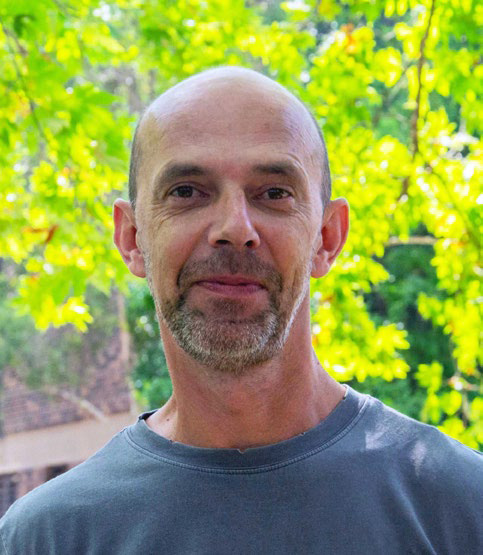
NEW STAFF
Dr Svyatoslav Shcheka completed his MSc in Geochemistry at the Moscow State University, Russia, before moving to Far East Geological Institute in 1992, where he experimentally studied the petrology of Pt-bearing ultramafic intrusions of Russian Siberia and Far East. He started his PhD project on carbon solubility in major mantle minerals at University of Tuebingen in 2001 and completed it in 2006. In late 2005 he moved to the Bavarian Research Institute of Experimental Geochemistry and Geophysics (BGI) at the University of Bayreuth, a partner institute of CCFS, where he mainly focused on experimental study of volatile elements in the Earth’s interior at high pressure and temperature until 2019.
In October 2019 Svyatoslav joined Macquarie University as a high pressure experimental scientist where he is setting up the new experimental laboratory, contributing to CCFS Flagship Program 3.
EARLY CAREER RESEARCHERS (ECR)
The second primary goal of CCFS (see Goals) concerns the recruitment, development and mentoring of Early Career Research (ECR) staff “for the development of the next generation of Australia’s geoscientists”.
These CCFS ECRs have all achieved high positions, both nationally and abroad, and are having significant impact across many countries including Japan, Spain, Chile, USA, Europe and Asia. They are contributing in diverse areas that include: the nuclear science and environmental sector, CSIRO, Geological Surveys, international Research Centres, Government instrumentalities, the exploration industry and in consultancies in the private sector.
The following profiles present 2018 ECRs and summarise their expertise and research areas.
New 2019

Dr Chunfei Chen completed his PhD in Earth Sciences at China University of Geosciences, Wuhan in December 2018, in which he studied the mantle recycling of limestone. During his PhD he visited Macquarie University and joined the CCFS research group where he used high-pressure experiments to reveal the melting behaviour of limestone in subduction zones and mantle wedges. Since mid-2018, he has also focused on studying high temperature Ca isotope geochemistry, especially for tracing carbonatite activity and recycled carbon in the mantle. In May 2019, Chunfei returned to Macquarie University as a Postdoctoral Research Fellow. Now he is engaged in the study of the physical and chemical behaviour of carbon in subduction zones and its role in driving mantle evolution.
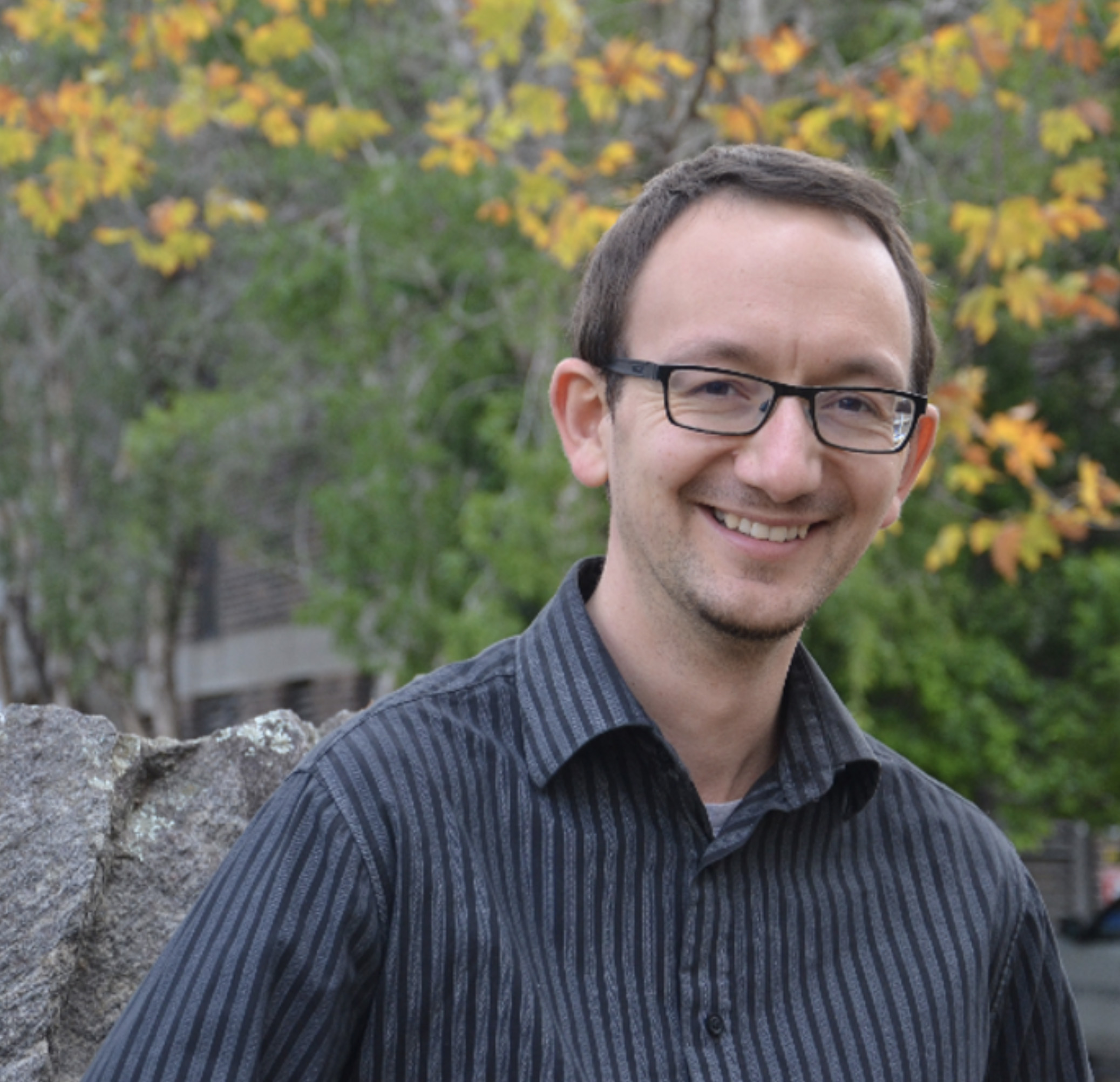
Dr Michael Förster studied geology at the Johannes Gutenberg University Mainz and joined CCFS at Macquarie University in 2016 as a PhD student in Prof Stephen Foley’s experimental petrology group. In 2019 he completed his PhD with the thesis entitled “Subduction Zone Metasomatism and its Consequences for Potassium-rich Magmatism and Deep Nitrogen Cycling”, where he investigated the geochemical behaviour of nitrogen and potassium in magma and mantle rocks. As a postdoctoral researcher, he is examining the fate of nitrogen during subduction and recycling to Earth’s mantle. The various reactions of nitrogen, forming reduced and oxidised species, are known as the nitrogen cycle. Nitrogen is also part of high- pressure fluids, and atmospheric nitrogen is continuously fixed and deposited in marine sediments which are recycled to Earth’s mantle in subduction zones. This recycling process is thought to be associated with potassium-bearing silicates, where micas play an integral role, for example through the substitution of ammonium for potassium in phlogopite. Using an experimental geological approach Michael is investigating the partitioning of nitrogen between minerals and fluids as well as minerals and melts by performing high-pressure piston cylinder-, belt-, and multi-anvil experiments on synthetic and natural mineral and rock samples. The experimental run products are analysed using electron the microprobe (EPMA) and secondary ion mass spectrometry (SIMS). His research contributes to CCFS Flagship Program 3.
Continuing
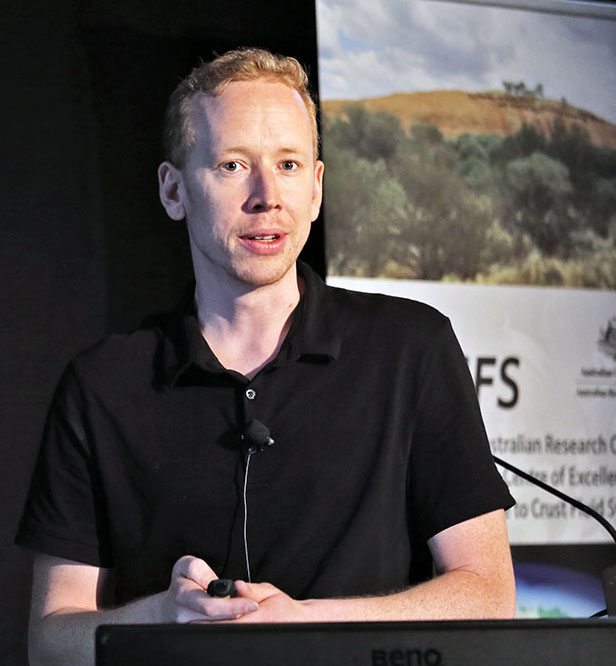
Dr Raphael Baumgartner received his MSc in Economic Geology from the University of Leoben (Austria). He joined CCFS/ CET at UWA in June 2013, as a PhD candidate, seeking to unravel the potential of martian igneous systems to host precious metal- enriched sulfide mineralisation. His work provided important insights into the behaviours of (highly) siderophile and chalcophile elements in martian mantle reservoirs and derived igneous systems through mineral-scale analytical experiments on sulfide and oxide phases from shergottite and chassignite meteorites - a rare group of meteorites that are thought to represent samples of the volcanic martian crust.
At the completion of his PhD, Raphael was employed as a Research Associate at CET. His research focused on the 3.5 Ga old stromatolites at North Pole Dome, Dresser Formation, Pilbara (WA) and their link to hydrothermal fluids. He examined whether such fluids delivered transition metals such as Zn, Mo and Ni, known to be key ingredients for bacterial metabolism and thus likely catalysts for the origin of life on Earth. For this research, Raphael examined the micron- to nano-scale textural and trace metal characterisation of associated Fe- and Zn-sulfide laminate using systematic in situ multiple sulfur- isotope analyses to unveil the potential microbial component of sulfide precipitation.
In 2018 Raphael took up a postdoctoral position at UNSW to continue his work with Martin Van Kranendonk’s group. Raphael’s research contributes to CCFS Flagship Program 4.
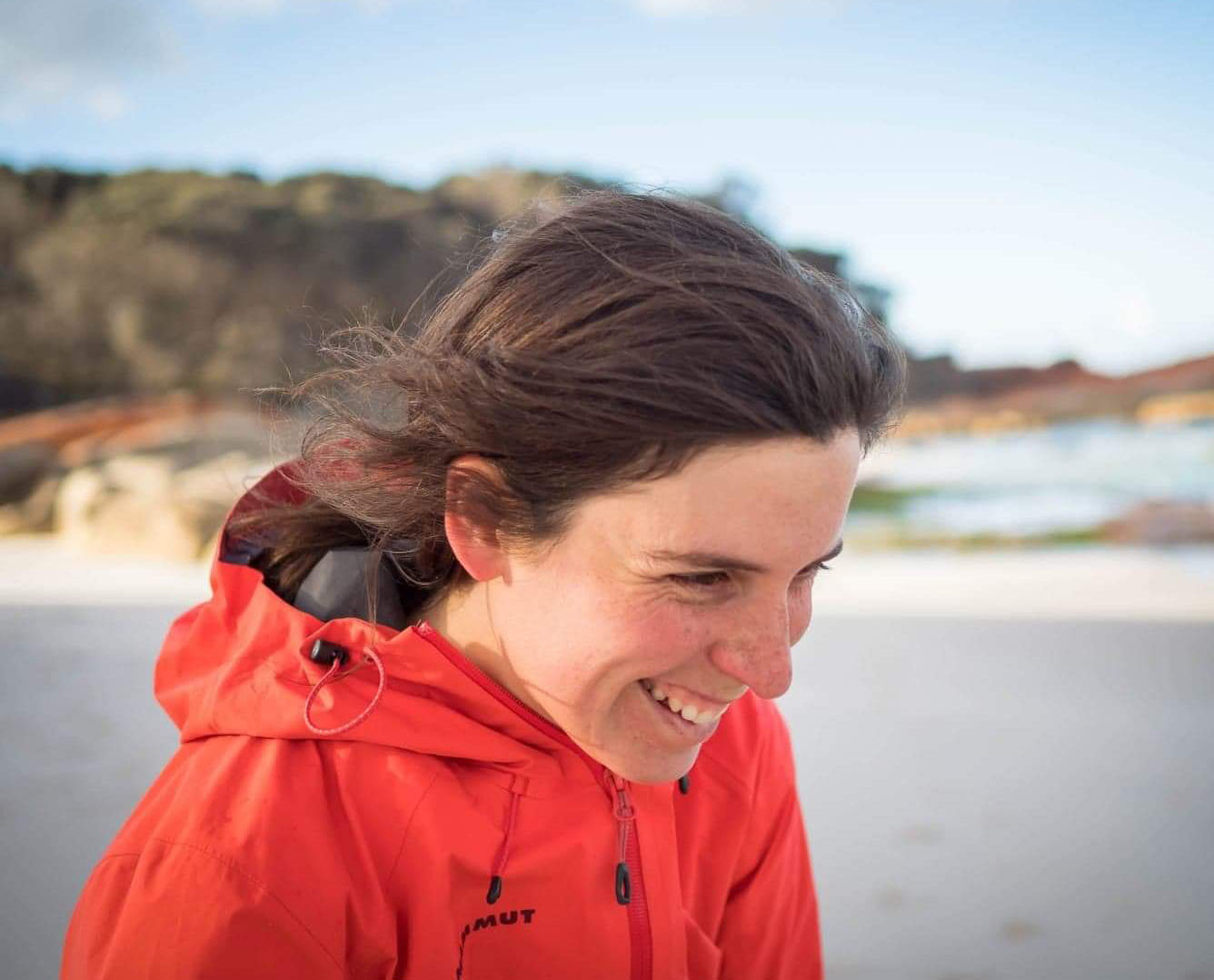 Dr Montgarri Castillo-Oliver completed her Bachelor and Master degrees in Geology at Universitat de Barcelona. In November 2014, she joined CCFS as a cotutelle PhD student, carrying out her research both at Universitat de Barcelona and Macquarie University. During her PhD, Montgarri characterised several Angolan kimberlites of the Las Lundas province, as well as their diamond indicator minerals (mainly ilmenite and garnet).
Dr Montgarri Castillo-Oliver completed her Bachelor and Master degrees in Geology at Universitat de Barcelona. In November 2014, she joined CCFS as a cotutelle PhD student, carrying out her research both at Universitat de Barcelona and Macquarie University. During her PhD, Montgarri characterised several Angolan kimberlites of the Las Lundas province, as well as their diamond indicator minerals (mainly ilmenite and garnet).
She also studied their mantle xenoliths to better understand the structure and metasomatic evolution of the subcontinental lithospheric mantle in NE Angola. In 2016, she graduated with a PhD from both universities Since then, Montgarri has been employed as a Research Associate by CCFS at Macquarie University. Her postdoctoral research is based on the use of in situ techniques [(MC)-LA-ICP-MS and SIMS] to characterise primary and secondary carbonates in kimberlites worldwide, combining textural information with in situ compositional and isotopic (C, O and Sr) analysis. This integrated approach provides new insights into the isotopic composition of the parental kimberlite melt, and thus that of the Earth’s mantle. It also allows discrimination between the different processes that led to carbonate formation in kimberlites (i.e. magmatic and deuteric crystallisation, degassing, weathering, etc.). By studying the C isotope variation of the deep mantle with space and time, Montgarri aims to contribute to the current understanding of the deep Earth’s carbon cycle in cratonic roots. This research contributes to CCFS Flagship Program 1.

Dr Denis Fougerouse completed his BSc at the university of Saint-Etienne (France). His MSc, at the University of Nancy (France), focused on the timing of mineralisation events in the West Africa Craton using Re-Os dating. In 2012, Denis commenced his PhD at the University of Western Australia in the Centre for Exploration Targeting (CET). Completed in 2015, his PhD focused on the mineralisation processes occurring in the giant Obuasi gold deposit.
Denis is currently a Postdoctoral Research Associate at Curtin University in the Geoscience Atom Probe group. He has worked on developing the geological applications of atom probe microscopy to a wide range of minerals including zircon, monazite, titanite, plagioclase and sulfides. In particular, Denis is investigating the mobility of trace elements and their implications for geochemistry and geochronology. His research contributes to CCFS Flagship Program 2.
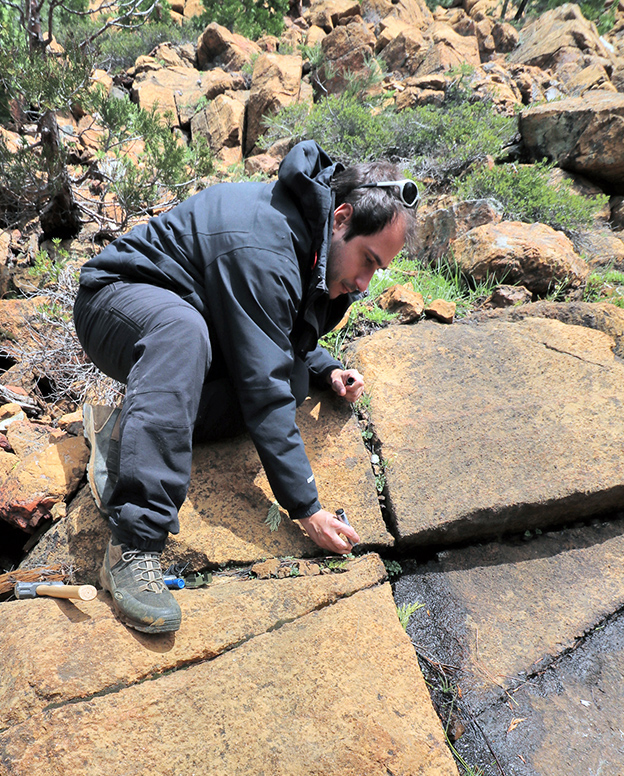
Dr Hadrien Henry is a Research Associate at CCFS, Macquarie University. He completed his BSc and MSc at the Université Paul Sabatier Toulouse III. In 2015, he commenced a cotutelle PhD degree between Macquarie University and Université Paul Sabatier, Toulouse III. Hadrien’s thesis focused on the microstructure and petrophysics of pyroxenites and mantle using samples from the Cabo Ortegal Complex, Spain and the Trinity ophiolite, California, USA. In 2018, he graduated from Université Paul Sabatier Toulouse III, and will graduate from Macquarie University in early 2019. As a Research Associate in CCFS at Macquarie University, Hadrien works on the microstructure of olivine megacrysts from Åheim peridotite body in western Norway and takes part in multiple collaborations involving Electron BackScattered Diffraction (EBSD) and the study of microstructures. Hadrien is also part of the TerraneChron® team at CCFS. This research contributes to CCFS Flagship Program 1.

Dr Johannes Hammerli completed his MSc in Earth Sciences at the University of Bern, Switzerland, before moving to Townsville, Australia. He received his PhD from James Cook University in 2014, where he studied element mobility during metamorphism and the identification of hydrothermal fluids by microanalysis. In late 2014 Johannes joined CET on a Swiss National Science Foundation Fellowship. During this time, he focused on studying crustal differentiation and evolution. In May 2016, Johannes joined the CCFS research group where he used the microanalysis of accessory minerals, in particular apatite from magmatic systems, to unravel processes which lead to the fertile systems feeding ore deposits.
In mid-2019, Johannes returned to the University of Bern, where he commenced an Ambizione fellowship. His research contributes to CCFS Flagship Program 2.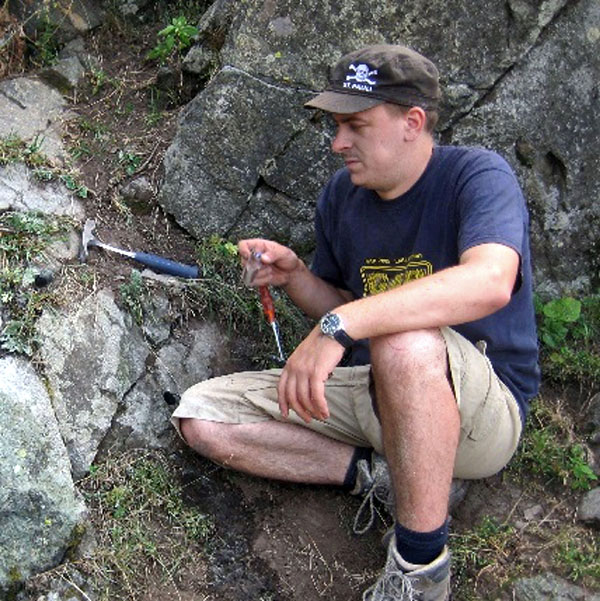
Dr Uwe Kirscher completed his PhD in geophysics at the Ludwig-Maximilians University in Munich in 2015 working on the Paleozoic paleogeography of the Central Asian Orogenic Belt using paleomagnetism. In early 2016, he joined Curtin University as a CCFS funded Research Associate as part of Professor Zheng- Xiang Li’s Laureate team. His research interests are focused on Proterozoic paleomagnetic constraints of the Australian Precambrian blocks. He aims to use several paleomagnetic approaches to constrain and more precisely understand the supercontinent cycle and its geodynamic features. His research contributes to CCFS Flagship Program 5.
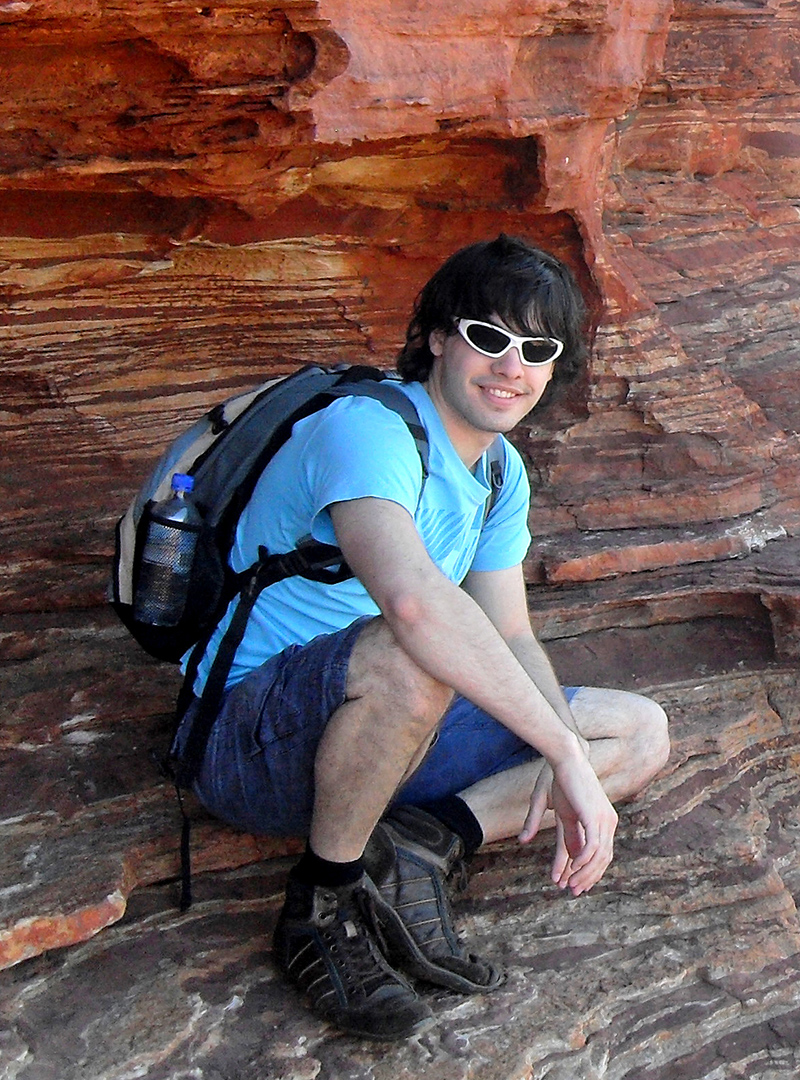
Dr Hugo Olierook completed his undergraduate studies at Curtin University in 2011. He continued at Curtin with a PhD examining the tectonic and stratigraphic evolution of the Western Australian margin. After completing his PhD in 2015, he moved to the University of Liverpool as an NERC postdoctoral associate studying reservoir quality in the United Kingdom and adjacent petroleum domains. In November 2016, Hugo returned to Curtin University and joined CCFS to take up a two-year postdoctoral fellowship as part of the SIEF Distal Footprints project in the Capricorn Orogen of Western Australia. Hugo used his expertise in geochronology, geochemistry, tectonics and geodynamics to understand the 3 billion year history of the Capricorn Orogen and its mineral endowment. In 2019 Hugo will continue at Curtin University as the manager of geochronology and geochemistry projects for the mining and mineral exploration industry, liaising with geological surveys around the globe.
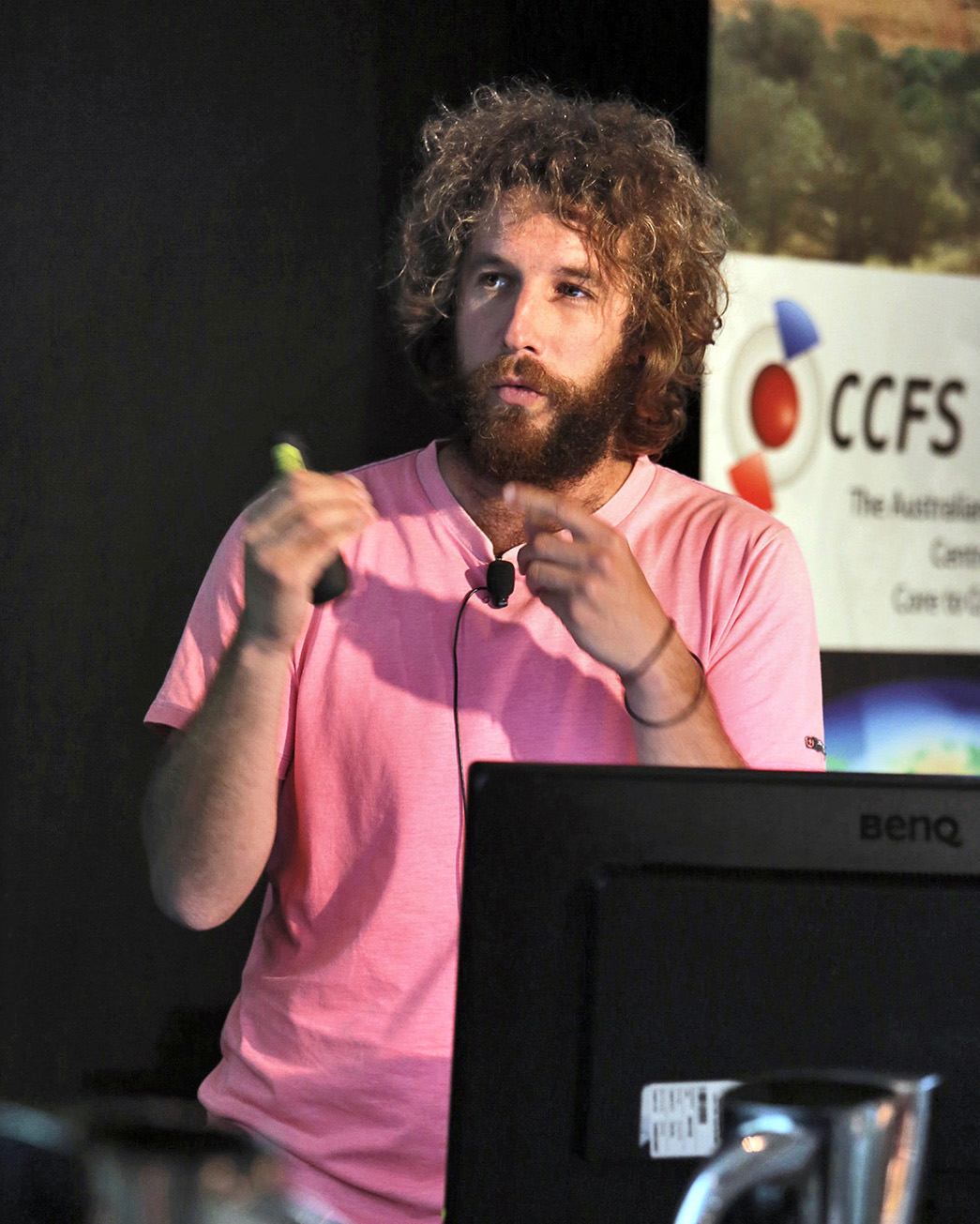
Dr Beñat Oliveira completed his Bachelor and Master degrees in Civil Engineering at Universitat Politecnica de Catalunya. In February 2013, he joined CCFS-MG3 as a PhD student, where he developed an internally-consistent numerical platform for multiphase reactive transport modelling. The numerical model is based on two main ingredients: 1) a general and scalable multi-phase approach, coupled with 2) a sound chemical thermodynamic framework for the reactive and chemical transport phenomena. He continues with his research as a Research Associate in CCFS. In his current role, he has expanded his code to quantitatively assess the origin and evolution of transcrustal magmatic systems, including both disequilibrium trace-element and isotopic modelling. This research contributes to CCFS Flagship Program 3.
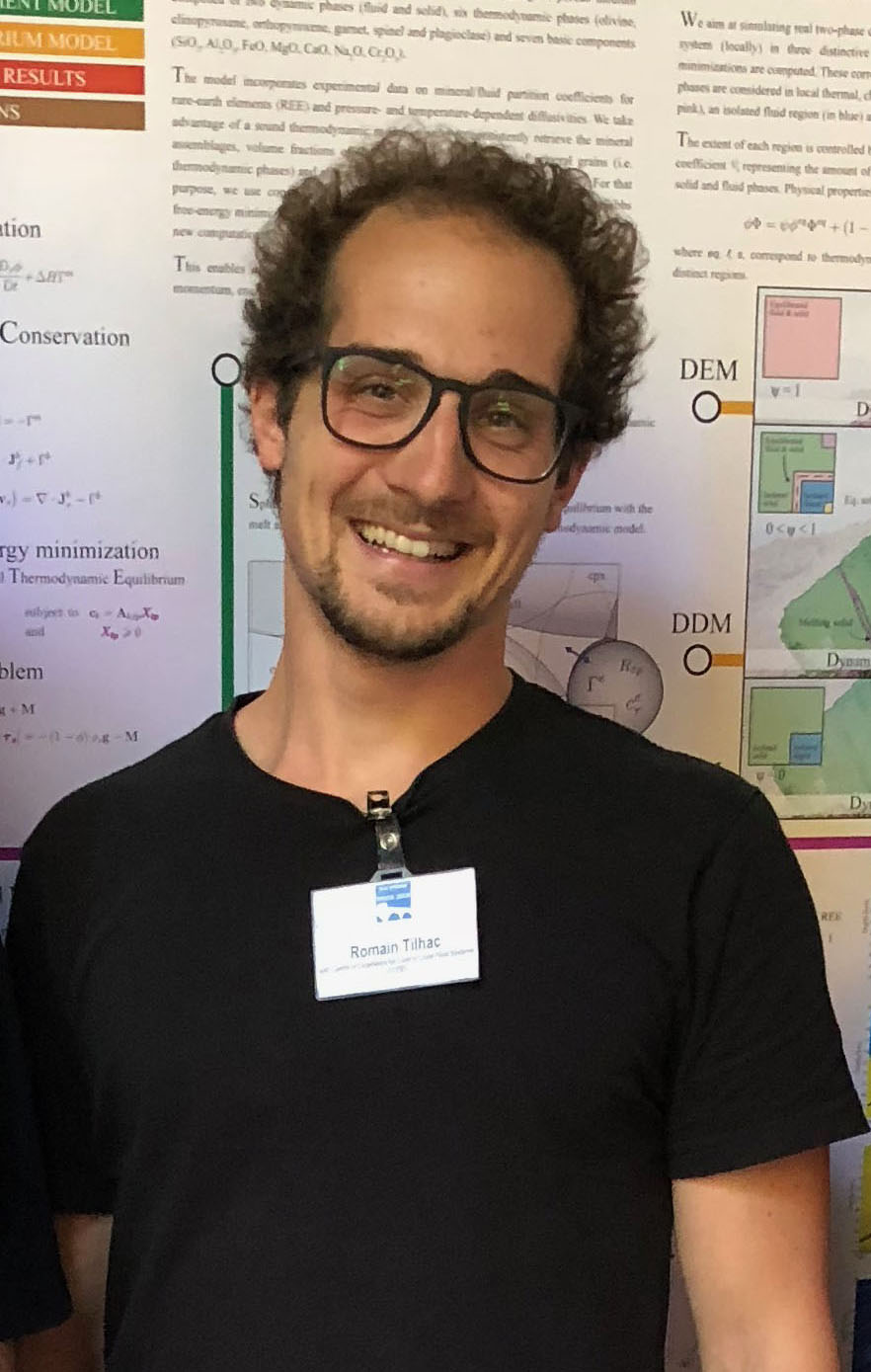
Dr Romain Tilhac completed his BSc and MSc in Earth and Planetary Sciences at Paul Sabatier University in Toulouse, France. He joined CCFS in 2013 as a cotutelle PhD student between Macquarie University and Paul Sabatier University. Romain’s thesis focused on the petrology, geochemistry and isotope geochemistry (Sr, Nd, Hf and Os) of arc-related mantle pyroxenites exposed in the Cabo Ortegal Complex, Spain. After graduating from both universities in 2016 and 2017, he took up a Research Associate position in CCFS at Macquarie University. His current research relates to the compositional evolution of the Earth’s mantle and the genesis of mantle-derived magmas, and associated tectonics and geodynamics. He uses petrology, in situ and solution geochemistry and geochronology of mafic and ultramafic terranes to understand the sources and differentiation processes of arc magmatism with the aim to better understand elemental mobility and isotopic fractionation associated with pyroxenite petrogenesis and the role of fluid- melt-rock interaction in subduction zones. This research contributes to CCFS Flagship Program 1 (TARDIS II).
Romain also works in collaboration with Beñat Oliveira on the numerical modelling of reactive transport associated with melt generation, migration and differentiation, melt-rock interaction and metamorphic reactions as part of the Flagship Program 3.
In October 2017, he became the manager of the TerraneChron® team at CCFS. TerraneChron® integrates in situ analysis of U-Pb ages, Hf-isotopes, and trace-element concentrations of zircons and fosters collaboration with industry and geological survey partners.
In November 2019 Romain took up a short-term postdoctoral position (until April 2020) at Kanazawa University with a Japan Society for the Promotion of Science (JSPS) Fellowship. In May 2020 he will commence a postdoctoral position at the Instituto Andaluz de Ciencias de la Tierra (IACT), Granada / Consejo Superior de Investigaciones Científicas (CSIC) with a Juan de la Cierva Fellowship.
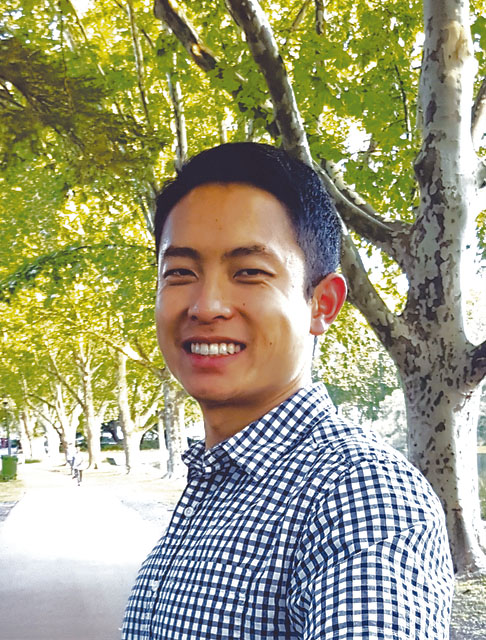
Dr Lei Wu received his PhD in 2017 from the University of Alberta, Canada where he reconstructed the amalgamation history of East Asia using paleomagnetic and seismological data. After his PhD, Dr Wu conducted a nine-month postdoc applying the shear wave splitting and receiver functions methods to determine the upper lithospheric mantle / crustal anisotropy in the Western Canada Sedimentary Basin.
In 2018, Dr Wu commenced a two-year postdoc position with CCFS at Curtin University, working with Zheng-Xiang Li to build a new global full- plate paleogeographic model.
His research interests involve geophysics, paleogeographic reconstruction, seismology and paleomagnetism. This research contributes to CCFS Flagship Program 5.

 ARC Centre of Excellence for Core to Crust Fluid Systems
ARC Centre of Excellence for Core to Crust Fluid Systems